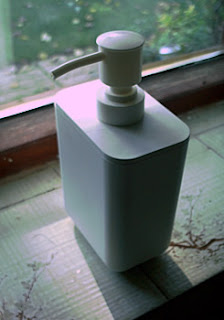 Having written about this Ecogen plastic in a previous post, I decided to actually buy something made out of it. My choice was a plastic soap dispenser. How boring! Well yes except the plastic was produced by feeding bacteria some corn starch sugars. It looks and feels like any other plastic product, but will biodegrade if buried in the ground for about 9 months.
Having written about this Ecogen plastic in a previous post, I decided to actually buy something made out of it. My choice was a plastic soap dispenser. How boring! Well yes except the plastic was produced by feeding bacteria some corn starch sugars. It looks and feels like any other plastic product, but will biodegrade if buried in the ground for about 9 months.
I have had some thoughts about this, there is of course an issue highlighted by the use of biofuels, eg. using land to produce fuel, that could produce food, is a waste of resources. I agree with that. But this is a bit different I think. Although the plastic in this case requires corn to be farmed, the product is robust and will hopefully last many years, unlike ethanol or other biofuels that would be burnt with in a year after the crop had been harvested
Secondly the plastic is storing carbon for as long as it lasts, where as fuel would return the carbon to the atmosphere within a year. Hence the plastic is a carbon store, like wood. The turnover from crop, to product and back to the earth again is longer than biofuels.
No comments:
Post a Comment